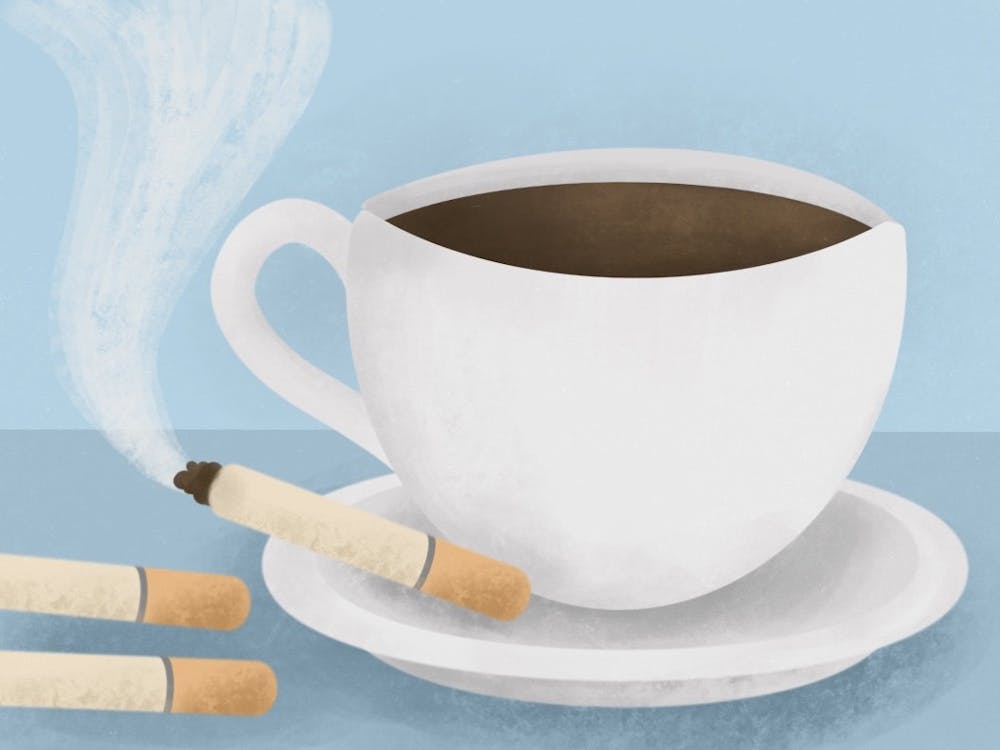Coffee and cigarettes. A classic combination in advertisements and movies from the 1980s and 1990s, said Madison Karaffa, a 27-year-old UF graduate.
A UF study, published Sep. 15, could establish that there is a neurological reason the two are connected.
Roger Papke, a UF pharmacology professor, was the principal investigator of the project that found a chemical compound in coffee potentially capable of aiding people who are seriously addicted to cigarettes.
“These people are really driven to have their drug,” Papke said. “And something in coffee may help them quench their desire for that drug.”
The team of researchers started the project with clones of human brain receptors, proteins in brain cell membranes. They were specifically nicotinic receptors — those commonly known to respond to nicotine, the addictive substance in cigarettes.
Researchers then watched how the receptors responded to coffee. First, a chemical compound in coffee called N-Methylpyrrolidone, or NMP, binded to a kind of receptor that was high sensitivity, or HS.
A 2010 study suggested NMP typically appears in greater numbers in dark roasted coffee. It also has been previously researched as a possible aid to stomach relief — the study found it blocks stomach cells from producing hydrochloric acid, the liquid that causes acid reflux.
The brain process NMP is involved in is called inhibiting a receptor, said Karaffa. This means that the receptor's need to have nicotine is soothed. Because of that, it could also soothe a person struggling with the need to have a cigarette, Karaffa said.
This could be especially effective in the morning, Papke said, when an addict has gone through a night’s sleep without nicotine and their brain receptors are sensitive.
“That could be very, very intense when they first get up,” Papke said.
However, a second reaction occurred with low sensitivity, or LS, nicotinic receptors when they interacted with coffee, according to the study’s abstract. The NMP in the coffee potentiated them — a process that intensifies the reaction instead of soothing it.
NMP increases the power of the reaction, Karaffa said, which could make a nicotine craving even greater.
“When it’s causing a response, there is kind of that addictive potential,” she said.
There are key differences between the two types of nicotinic receptors, she said. HS receptors are more sensitive to lower levels of nicotine and are satisfied faster. LS receptors don’t require as much attention, but they’re tricker to satisfy, Karaffa said.
So there are two opposite reactions happening when someone drinks coffee, she said. One satisfies the HS receptors, and the other makes the LS receptors stronger.
This means there needs to be more research before coffee can be considered a definitive cure for a nicotine addiction, Papke said.
Karaffa, who graduated from UF in August, said she was taking a graduate class taught by Papke that inspired the project. He was talking about addiction at the time, which ended up piquing her interest, she said.
They developed the idea for the project about coffee and cigarettes together, Karaffa said.
Although Karaffa said they studied the project in the context of cigarettes, she also said it’s possible it could apply to people who vape as well.
The topic could also be more complex, she said. The contents of vape juice are less regulated than cigarettes, she said, and so addiction could be coming from other places —– but a nicotine addiction from vaping could still be affected by coffee, she added.
A University of Michigan study found 22%, or more than one in five college students vape nicotine across the U.S.
“I think that addiction in general is pretty interesting,” she said. “Especially with cigarettes. The risks are widely known and touted and yet people can’t give it up.”
Contact Siena at sduncan@alligator.org. Follow her on Twitter @SienaDuncan.

Siena Duncan is the Fall 2024 Editor-in-Chief of the Alligator. She's interned for the Salt Lake Tribune, the Tampa Bay Times and POLITICO. In her spare time, she loves to take walks to see the cows by her apartment and add more to her sketchbook.






